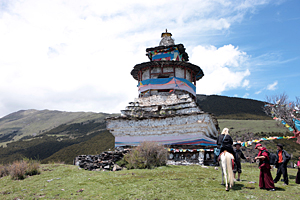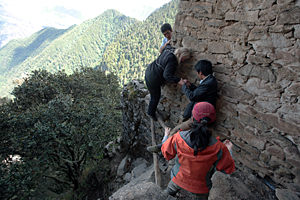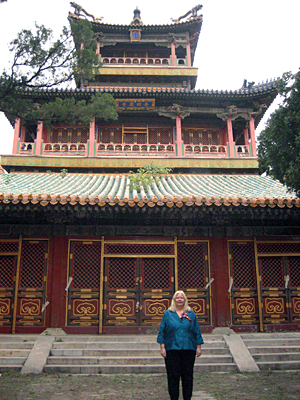

ADVERTISEMENT
- Rozovsky wins prestigious NSF Early Career Award
- UD students meet alumni, experience 'closing bell' at NYSE
- Newark Police seek assistance in identifying suspects in robbery
- Rivlin says bipartisan budget action, stronger budget rules key to reversing debt
- Stink bugs shouldn't pose problem until late summer
- Gao to honor Placido Domingo in Washington performance
- Adopt-A-Highway project keeps Lewes road clean
- WVUD's Radiothon fundraiser runs April 1-10
- W.D. Snodgrass Symposium to honor Pulitzer winner
- New guide helps cancer patients manage symptoms
- UD in the News, March 25, 2011
- For the Record, March 25, 2011
- Public opinion expert discusses world views of U.S. in Global Agenda series
- Congressional delegation, dean laud Center for Community Research and Service program
- Center for Political Communication sets symposium on politics, entertainment
- Students work to raise funds, awareness of domestic violence
- Equestrian team wins regional championship in Western riding
- Markell, Harker stress importance of agriculture to Delaware's economy
- Carol A. Ammon MBA Case Competition winners announced
- Prof presents blood-clotting studies at Gordon Research Conference
- Sexual Assault Awareness Month events, programs announced
- Stay connected with Sea Grant, CEOE e-newsletter
- A message to UD regarding the tragedy in Japan
- More News >>
- March 31-May 14: REP stages Neil Simon's 'The Good Doctor'
- April 2: Newark plans annual 'wine and dine'
- April 5: Expert perspective on U.S. health care
- April 5: Comedian Ace Guillen to visit Scrounge
- April 6, May 4: School of Nursing sponsors research lecture series
- April 6-May 4: Confucius Institute presents Chinese Film Series on Wednesdays
- April 6: IPCC's Pachauri to discuss sustainable development in DENIN Dialogue Series
- April 7: 'WVUDstock' radiothon concert announced
- April 8: English Language Institute presents 'Arts in Translation'
- April 9: Green and Healthy Living Expo planned at The Bob
- April 9: Center for Political Communication to host Onion editor
- April 10: Alumni Easter Egg-stravaganza planned
- April 11: CDS session to focus on visual assistive technologies
- April 12: T.J. Stiles to speak at UDLA annual dinner
- April 15, 16: Annual UD push lawnmower tune-up scheduled
- April 15, 16: Master Players series presents iMusic 4, China Magpie
- April 15, 16: Delaware Symphony, UD chorus to perform Mahler work
- April 18: Former NFL Coach Bill Cowher featured in UD Speaks
- April 21-24: Sesame Street Live brings Elmo and friends to The Bob
- April 30: Save the date for Ag Day 2011 at UD
- April 30: Symposium to consider 'Frontiers at the Chemistry-Biology Interface'
- April 30-May 1: Relay for Life set at Delaware Field House
- May 4: Delaware Membrane Protein Symposium announced
- May 5: Northwestern University's Leon Keer to deliver Kerr lecture
- May 7: Women's volleyball team to host second annual Spring Fling
- Through May 3: SPPA announces speakers for 10th annual lecture series
- Through May 4: Global Agenda sees U.S. through others' eyes; World Bank president to speak
- Through May 4: 'Research on Race, Ethnicity, Culture' topic of series
- Through May 9: Black American Studies announces lecture series
- Through May 11: 'Challenges in Jewish Culture' lecture series announced
- Through May 11: Area Studies research featured in speaker series
- Through June 5: 'Andy Warhol: Behind the Camera' on view in Old College Gallery
- Through July 15: 'Bodyscapes' on view at Mechanical Hall Gallery
- More What's Happening >>
- UD calendar >>
- Middle States evaluation team on campus April 5
- Phipps named HR Liaison of the Quarter
- Senior wins iPad for participating in assessment study
- April 19: Procurement Services schedules information sessions
- UD Bookstore announces spring break hours
- HealthyU Wellness Program encourages employees to 'Step into Spring'
- April 8-29: Faculty roundtable series considers student engagement
- GRE is changing; learn more at April 15 info session
- April 30: UD Evening with Blue Rocks set for employees
- Morris Library to be open 24/7 during final exams
- More Campus FYI >>
8:32 a.m., Nov. 30, 2009----In the setting of an inner courtyard of the Forbidden City in Beijing, China, Prof. Chandra Reedy of the University of Delaware was one of just nine foreign scholars honored on Oct. 16 for their accomplishments and stature in the field of Tibetan Buddhist studies.
The occasion was the opening of the new Palace Museum Research Center for Tibetan Buddhist Heritage, and Reedy, a professor in the School of Urban Affairs and Public Policy whose primary appointment is in the Center for Historic Architecture and Design (CHAD), was presented with an appointment as a permanent Guest Fellow of the new research center.
“I am deeply honored by this recognition and humbled by my inclusion with so many outstanding Tibetologists. I look forward to many years of continuing collaboration with the Palace Museum and its new Tibetan research center,” Reedy said.
The Forbidden City was the imperial palace of the Ming and Qing dynasties. There was strong interest in Tibetan Buddhism by the court during these periods and constant contact and exchanges with the major monasteries and religious teachers of Tibet. As a result, dozens of temples in the Forbidden City are dedicated to Tibetan Buddhism, and the Palace Museum houses more than 20,000 works of Tibetan art.
Research Center for Tibetan Buddhist Heritage
The Palace Museum established the new Research Center for Tibetan Buddhist Heritage to promote national and international cooperation and scholarly communication for the study of its Tibetan holdings and related art and material culture. Leading up to the inauguration of the new center, the Palace Museum began initiating a series of international research projects and fieldwork efforts in 2005.
In announcing the recent achievements of the new center, Wang Yuegong and Luo Wenhua of the Palace Museum highlighted a cooperative documentation and preservation project with the University of Delaware. This fieldwork on Ming-period Tibetan Bon cave temple wall paintings of Nga ba Prefecture in Sichuan Province involves Reedy and a team of faculty and students from CHAD, a Palace Museum team, and a team from the Sichuan Research Institute for Archaeology.
During the courtyard ceremony 10 Chinese scholars were named Guest Fellows of the new center along with the nine foreign scholars. Reedy was one of three Americans who were honored. The Guest Fellows were presented with credentials imparting staff access to the Forbidden City and an extensive set of publications of Tibetan holdings in the Palace Museum.
Following the ceremonies, Reedy presented a paper at the 4th International Conference on Tibetan Archaeology and Arts, co-hosted by the Palace Museum and Capital Normal University. After the conference she met with the Palace Museum's deputy director of research, Song Lingping; senior research fellow of the new center, Luo Wenhua; and deputy director of the Cultural Relics Conservation Institute of the Tibet Autonomous Region, He Jing, to discuss expanding UD's Sichuan fieldwork project to include temples and wall paintings in the Lhasa area.
Reedy reports that the discussions were very positive, with a long-term collaborative initiative outlined for the documentation and preservation of Bon temples. Bon is the pre-Buddhist indigenous religious tradition of Tibet.
“I am very excited about the possibility of being able to expand UD graduate and undergraduate fieldwork opportunities in Tibetan areas of China,” Reedy said.



